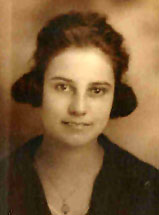 My great-grandmother, Annie Lola Jennings Cunningham, died when I was ten. As with my great-grandfather, Herman Cunningham, I don’t have many memories of her because I lived in Colorado and she lived in Texas, but, as with my great-grandfather, I do remember her.
My great-grandmother, Annie Lola Jennings Cunningham, died when I was ten. As with my great-grandfather, Herman Cunningham, I don’t have many memories of her because I lived in Colorado and she lived in Texas, but, as with my great-grandfather, I do remember her.
Annie Lola Jennings was born October 4, 1899 in Tulia, Swisher County, Texas. Her grandmother, Lucinda Fannie Curry Jennings, moved west to Texas from Alabama in the summer of 1880, after her husband, John B. Jennings, was murdered. Family legend says she feared her sons would seek revenge against the man who killed their father one day unless she moved them away. John B. Jennings and Lucinda Fannie Curry had five children: Alpha Jennings, Daisie Z. Jennings, Veto Curry Jennings (Annie’s father), Richard Otto Jennings, and Worth Alston Jennings.
One of the things I will always remember about Granny (as I called my great-grandmother) is that every time I visited her she told me that her father had the same birthday as I did — September 17. I was a child and couldn’t be less interested in some old dead man’s birthday (as I thought at the time). I could tell that Granny thought this was special, and also that she didn’t realize she had already told me (or else thought I didn’t remember). Now I feel ashamed of feeling like that, but I was just a child, so I suppose I can be forgiven. Later, when I found my great-grandmother on the 1900 census, I found in the row next to her father’s name that he was born in September 1869. I don’t think I will ever forget that moment. I realized, looking at the microfilm, that I knew exactly what day in September because Granny had told me so many times. For the first time in my genealogical research, I connected these names with living, breathing people. It was a profound moment for me.
Veto Curry Jennings married Mary A. Silla Stallings (b. March 31, 1872) on December 2, 1888 in Fannin County, Texas. They had six children: Lennice Jennings, Lee Orman Jennings, Frank Gray Jennings, Annie Lola Jennings, Daisy Eysel Jennings, and Mary Ethel Jennings. There is also a Lela May Jennings born September 13, 1892 buried in the family plot at Rose Hill Cemetery in Tulia, Swisher County, Texas. She may be a daughter who died at birth or shortly thereafter.
Granny’s grandmother, Lucinda Fannie Curry Jennings was living with her son Veto Curry Jennings at the time of her death on September 18, 1912. Granny and her sisters found their grandmother. Mary A. Silla Stallings Jennings, Granny’s mother, had died two years before on June 18, 1910. Veto Curry Jennings remarried Venera L. Cluck . She was known in the family as “Aunt Jenny”; it was she who suggested the name Udell for my grandfather after a book she liked, Harold Bell Wright’s That Printer of Udell’s.
Annie Jennings became a teacher and met her future husband, Herman Cunningham, when she boarded at the Cunningham house. It was in this same way that Herman Cunningham’s parents, Amos Blakey Cunningham and Stella Ophelia Bowling met; she was a teacher and boarded with a number of county families, including the Cunninghams, in the 1890’s.
Annie Jennings and Herman Cunningham married on June 20, 1920 in Tulia, Swisher County, Texas. These photographs were taken on their wedding day:
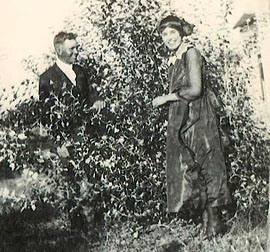
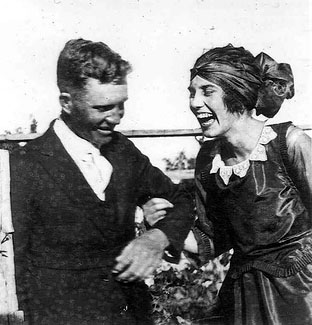
My mother’s cousin Connie Luene Reed Bertrand, is currently in possession of Granny’s wedding dress. According to Connie Lue,
It is navy with handmade pleats and lace and all. It is in pretty bad shape, but I can’t throw it away.
It seems that after Papaw [note: I have only ever seen Herman’s nickname spelled Pa Pa, and this is how I remember it being spelled on the funeral wreath at his wake/viewing] died, Granny may have taken his death worse than any of us knew. Carolyn [Carolyn Cunningham, Annie’s daughter] came home from work one day and found this wedding dress in the trash barrel. Luckily, Granny had not burned the trash (you may not know that in the olden days, folks around here burned their own trash and garbage in large metal barrels). Carolyn didn’t ask her about it. She just took the dress out of the trash and hid it from Granny until she came to work, here in Floydada, the next day. Carolyn called me and I came to get it and still have it.
We thought that maybe she was angry with Papaw for dying. I’ve heard of that and it would make sense that she did do that. As far as I know, she never mentioned throwing the dress away to anyone and never knew that Carolyn had saved it.
If you ever are in the neighborhood, you MUST come by and see this dress. Mom showed me some of the features of the dress and explained why it was made the way it was. One of the features is a maternity feature. She made it for an “all occasion” dress since they were poor. It is very ingenious. And it is very beautiful.
I know that my great-grandmother and her daughter Flois were both seamstresses. My grandmother told me about showing Granny some dresses she had made for my mother in order to earn her approval. Granny was somewhat notorious in her dislike for her daughters and sons-in-law; she had been known to refer to them as her “out-laws.” My mother, however, says that she was very loving and gentle with her grandchildren, and that is how I remember her, too.
Mom says that when she was little and scraped her knee, she preferred to go to Granny to get fixed up rather than her own mother. She insisted that although Granny and my grandmother did the same thing — put Campho-Phenique and a bandage on the scrape — Granny blew on it, which Mom insists prevented it from hurting.
Granny always sent me a card for my birthday. I remember one year that she sent me some toy cars as a gift; I can no longer remember if it was a birthday or Christmas gift, but I think it was Christmas. I wrote a thank-you note and showed it to my mother. Mom was aghast because she felt that my letter was rude. I remember what I said, and Mom was right. I told Granny “Thank you for the cars, but we are not boys.” Mom made me rewrite it, so thank goodness I never sent that rude letter to my Granny! My edited letter was much more gracious.
I will always remember Granny in her kitchen. Even in her 80’s, her hair was jet black. My grandfather heard the family had Cherokee ancestry. He believed himself, according to family legend, to be 1/8 Cherokee through his mother’s family. If this were true, Granny would have been 1/4 Cherokee, meaning one of her grandparents — John B. Jennings, Lucinda Fannie Curry, John Thomas Stallings, or Sarah Long Thomas would have been full-blooded Cherokee. I can find absolutely no corroboration for this. I don’t entirely discount that there may be Cherokee ancestry, as my grandmother had dark skin, eyes, and hair, as well as high cheekbones, that are common features of Native Americans, but I can find no proof that Annie had a Native American grandparent, and such stories should be taken with the proverbial grain of salt.
Granny used to make orange Kool-Aid for Pa Pa (my great-grandfather). My mother asked Granny if she might make another flavor some time, but Granny insisted that was what Pa Pa liked.
Granny also used to tat lace. She tatted snowflake Christmas ornaments that several family members have. She also used to crochet. She made booties for me when I was a baby. I still have one bootie (it’s mate, sadly, has been lost in various moves we have made). It is in good condition except the ties used to have balls on the ends that have fallen off. My own daughters wore these booties, but the mate had been lost by the time my son was born.
I only remember visiting Granny a few times before she died on April 8, 1982. She had a stroke. My aunt Carolyn found her when she came home. She entered the hospital and had a second stroke some days later, which was the cause of her death. Many family members believe that she simply didn’t want to live without Pa Pa. He died eight days before their 60th wedding anniversary.
I remember going to her funeral, but not as clearly as Pa Pa’s. For instance, I do not remember going to a viewing, though we probably had one, and I do not remember the service at all, as I remember Pa Pa’s. My recollections are very vague.
As with my great-grandfather, I wish I had been able to know her better, but I suppose I am fortunate to have known her at all.
Sources:
Bertrand, Connie Lue. “Cunningham Picture.” E-mail to Dana Huff. 5 Aug. 2005.
Jennings, Jan. 2006. Descendants of John B. Jennings. (PDF version of document sent in e-mail to Dana Huff, 24 Jul. 2006).
Note: This post is Part 2 in a series on grandparents and other relatives I remember personally in my lifetime.

 My great-grandfather, Herman Cunningham, died when I was not quite nine. I don’t have many memories of him, as he lived in Texas and I lived in Colorado. However, I do remember some things, and this post is a biography of my great-grandfather focusing on all of my memories with a bit of what I’ve learned from others.
My great-grandfather, Herman Cunningham, died when I was not quite nine. I don’t have many memories of him, as he lived in Texas and I lived in Colorado. However, I do remember some things, and this post is a biography of my great-grandfather focusing on all of my memories with a bit of what I’ve learned from others.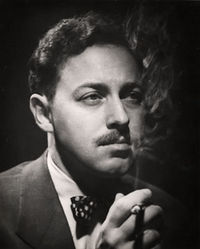 I recently posted about my
I recently posted about my 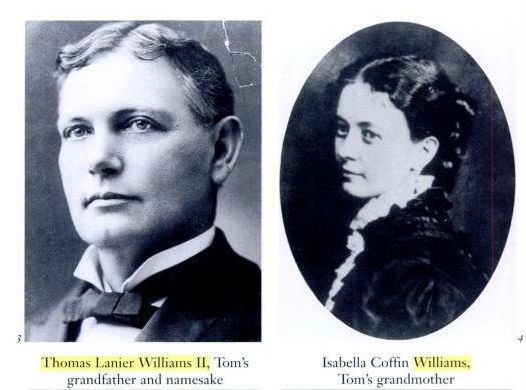
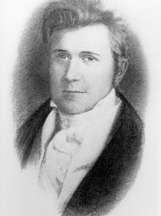 John Williams was born to John Williams (1778-1837) and Melinda White (1789-1838). John Williams, Sr. was known as “Prince John.” He was a veteran of the War of 1812 and
John Williams was born to John Williams (1778-1837) and Melinda White (1789-1838). John Williams, Sr. was known as “Prince John.” He was a veteran of the War of 1812 and 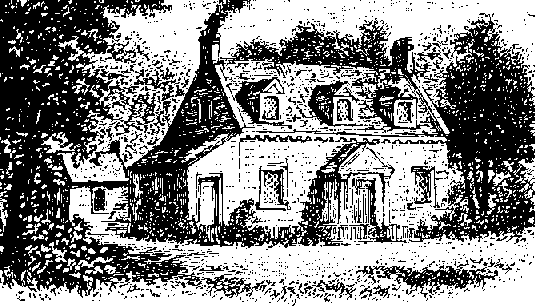
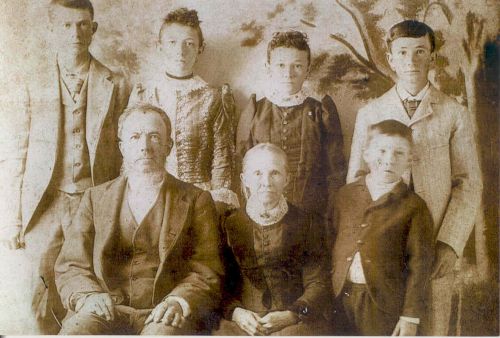
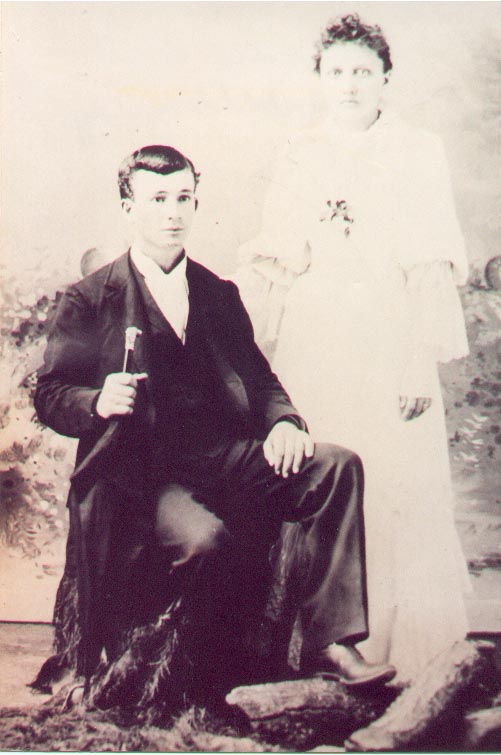
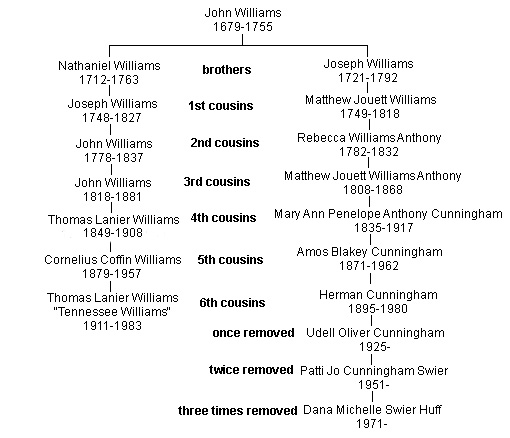
 On February 19, our family lost its matriarch — my great-grandmother, Lucille Thurman. Granny, as she was affectionately known by all of her grandchildren, was 91 years old. Granny had been ill with leukemia for some time preceding her death. She was buried in Marietta, Oklahoma, next to my great-grandfather, Elmer Theodore “Ted” Thurman, who passed away two years ago this past October.
On February 19, our family lost its matriarch — my great-grandmother, Lucille Thurman. Granny, as she was affectionately known by all of her grandchildren, was 91 years old. Granny had been ill with leukemia for some time preceding her death. She was buried in Marietta, Oklahoma, next to my great-grandfather, Elmer Theodore “Ted” Thurman, who passed away two years ago this past October.